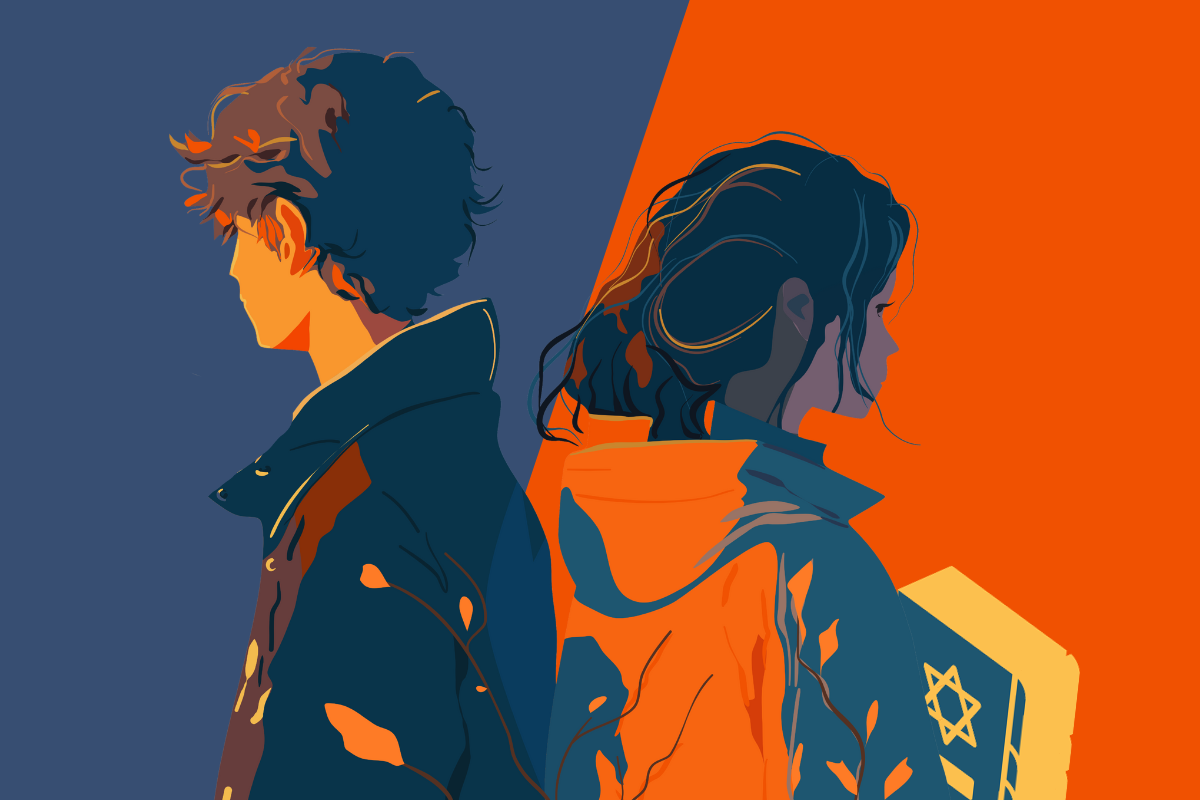I adored my best friend. He was electric, gentle and engaging. He was the first one to welcome me into our small synagogue. I had grown up not religious, so after I essentially wandered in off the street, I often felt out of place because I barely knew any of the customs or conventions. When I first joined it felt like I stuck out and was invisible at the same time, but when he was there he would always make sure I had someone to talk to at Kiddush or had a Shabbat meal. He truly saw me as part of the synagogue community, and more largely as part of our Jewish community, and that meant the world to me.
We started hanging out every week. We’d spend hours lamenting work, dissecting our love lives and talking about whatever was on our mind at the time. He was the first one I’d go to with wins, losses and questions. So when our friendship exploded in the fall of 2019, I was left alone to question: How could something that seemed so solid fall apart so fast?
The thing about friendship breakups is that everyone seems to have experienced one. When I told people of the event that brought my life to a screeching halt, they would just smile at me sympathetically. “It gets better with time!” they’d promise, and I’d wonder if they were talking to me or assuring themselves. Either way, I found little comfort in talking about it with most people. Instead, I found consolation in an unsuspected place: the Talmud.
The Talmud is a recording of the Jewish oral law. It contains rulings, known as halacha, but also myths and stories about the rabbis making the law. Nestled in a section called Bava Metzia lies a heart-wrenching tale of a great friendship that fell apart. It was there that I found a refuge for my grief.
The story begins with the meeting of Rabbi Yochanan, a distinguished rabbi, and Reish Lakish, a thief who had studied Torah in his youth. Reish Lakish sees Rabbi Yochanan bathing in the river and mistakes him for a beautiful woman, so he goes in after him.
When Rabbi Yochanan notices him, he says “your strength is fit for Torah!” After realizing his mistake, Reish Lakish replies, “your beauty is fit for a woman!” Rabbi Yochanan tells him if he comes back to Torah study, he can marry Rabbi Yochanan’s sister, who is even more beautiful. Reish Lakish agrees and Rabbi Yochanan takes him under his wing. Reish Lakish marries the sister, and in time becomes a great scholar. In the process, Rabbi Yochanan and Reish Lakish become very close.
Everything is going great until one day, in the middle of the study hall (and in front of their entire community), Rabbi Yochanan and Reish Lakish get into a fight over a halacha ruling. It escalates to the point where Rabbi Yochanan says “a bandit knows banditry” — essentially, “you would know that because you were a thief.” Reish Lakish gets angry and yells, “What good did you do by bringing me here?” Rabbi Yochanan replies: “I brought you under the wing of the Divine presence.”
Rabbi Yochanan is insulted and as a result, Reish Lakish falls ill. Rabbi Yochanan’s sister — who you’ll recall, is also Reish Lakish’s wife — goes to beg her brother to pray for Reish Lakish for the sake of their children. Rabbi Yochanan is still angry so he refuses. Without Rabbi Yochanan’s cooperation, Reish Lakish dies.
Rabbi Yochanan becomes extremely depressed, so the other rabbis decide to send him a new study partner. Rabbi Yochanan becomes angry because the new rabbi doesn’t disagree with him, ever, whereas Reish Lakish would challenge him constantly. He runs through the streets tearing his clothes and shouting “Where are you?” until he dies.
The other rabbis shrug and pray for his soul.
In a way, the Talmud brings us both closer and gives us a little distance from our emotions. As I grieved the end of my friendship, I found those who knew the story of Rabbi Yochanan and Reish Lakish were uniquely suited to understanding my grief. They could relate to me by agreeing that the story was very sad. It was as if they were grieving with me in a way that felt deeper than before. Sometimes, especially with grief, that is the best thing anyone can do for you.
I think the hidden moral of the story is that we could all stand to love and care for each other more. While we now mourn the downfall of Rabbi Yochanan and Reish Lakish, the rabbis at the time seemed to have very little emotional awareness as to what was going on. When Reish Lakish is dying, they are nowhere to be found; when he dies, they are concerned only with replacing him for Rabbi Yochanan. No one offers any comfort to either of them. I wonder if either of them would have been spared if the other rabbis had been able to remind them: “Hey… you love each other.” When we’re angry, we don’t always think clearly; sometimes we need to be reminded about what matters. I think the whole time I mourned my own friendship breakup, that’s what I was looking for: an affirmation of its existence.
Despite its tragic end, this story continues to keep me optimistic for the future. It’s good when we can see ourselves in the Talmud. When our stories are ancient repetitions, it means that there’s always a chance to get it right — a chance to do better. We can think of this story as a great tragedy, or we can ask the question: “What if Reish Lakish had been saved?” When I read the story, I see a world where each party was given a little more love and care. I see a world where a community sees relationships amongst members as sacred and acts accordingly. I see a world where, when somebody dies, people come up just to say “hey, I miss them too.” Sometimes I wish people could better understand my grief, but I have come to understand that in many ways, society just isn’t set up to handle these kinds of fallouts. I hope that maybe someday it will be.
It’s been four years now since I last saw my best friend, or even really spoke with him. I think I’ve finally accepted that there will be no further reconciliation. No more Friday night Kiddush, no more Shabbat dinners, no more snarky texts about how we both hate our jobs. Our friendship once existed, but it doesn’t exist anymore. We now exist separately, just halfway across the world from one another physically, but worlds apart mentally and emotionally. I still think of him from time to time. Sometimes his name just pops into my head — no sound or image, simply a call into the void, just to see if he will respond.
If someone were to tell me of a friendship breakup they were going through, I don’t know what I would say. Would I utter that frustrating cliche, “It gets better with time?” I know now that there’s truth in it, but it still feels like a platitude.
I think I would do what I am doing now: I would tell them the story of Rabbi Yochanan and Reish Lakish. I would acknowledge that each time we read their story, their relationship is doomed to fall apart — and though we know that is true, we still mourn it in our hearts every time. I’d tell them about my own experience reading the text, how I mourn for the two of them and their lost friendship a little bit more each time, and how I accept the end of my own friendship a little bit more each time, too. I’d tell them that mourning is within them too, and certainly within their own story. I’d tell them that every time they think of their lost loved one, each time that specific name pops into their head, they are not alone. Countless generations of Talmud readers are also calling out to lost friends: “Where are you?”



